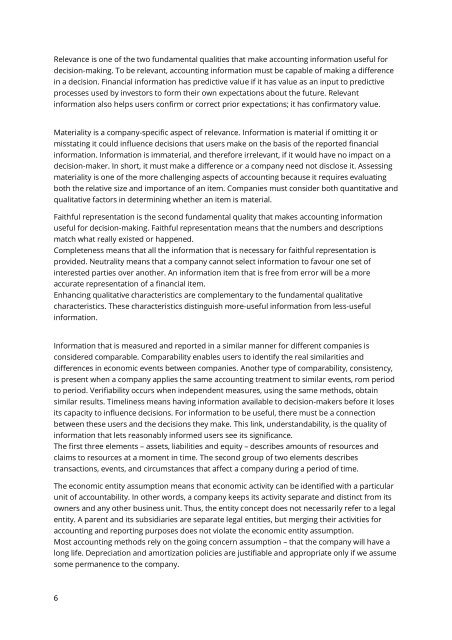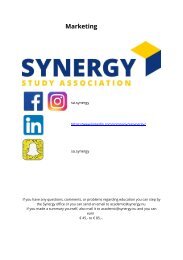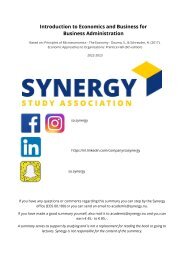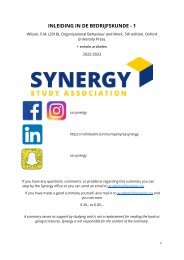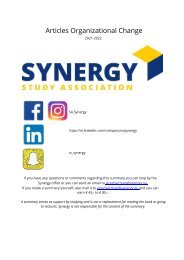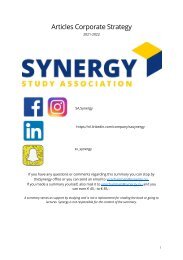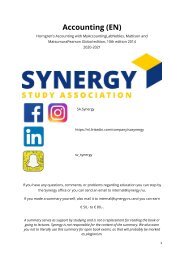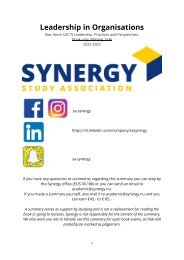Create successful ePaper yourself
Turn your PDF publications into a flip-book with our unique Google optimized e-Paper software.
Relevance is one of the two fundamental qualities that make accounting information useful for<br />
decision-making. To be relevant, accounting information must be capable of making a difference<br />
in a decision. <strong>Financial</strong> information has predictive value if it has value as an input to predictive<br />
processes used by investors to form their own expectations about the future. Relevant<br />
information also helps users confirm or correct prior expectations; it has confirmatory value.<br />
Materiality is a company-specific aspect of relevance. Information is material if omitting it or<br />
misstating it could influence decisions that users make on the basis of the reported financial<br />
information. Information is immaterial, <strong>and</strong> therefore irrelevant, if it would have no impact on a<br />
decision-maker. In short, it must make a difference or a company need not disclose it. Assessing<br />
materiality is one of the more challenging aspects of accounting because it requires evaluating<br />
both the relative size <strong>and</strong> importance of an item. Companies must consider both quantitative <strong>and</strong><br />
qualitative factors in determining whether an item is material.<br />
Faithful representation is the second fundamental quality that makes accounting information<br />
useful for decision-making. Faithful representation means that the numbers <strong>and</strong> descriptions<br />
match what really existed or happened.<br />
Completeness means that all the information that is necessary for faithful representation is<br />
provided. Neutrality means that a company cannot select information to favour one set of<br />
interested parties over another. An information item that is free from error will be a more<br />
accurate representation of a financial item.<br />
Enhancing qualitative characteristics are complementary to the fundamental qualitative<br />
characteristics. These characteristics distinguish more-useful information from less-useful<br />
information.<br />
Information that is measured <strong>and</strong> reported in a similar manner for different companies is<br />
considered comparable. Comparability enables users to identify the real similarities <strong>and</strong><br />
differences in economic events between companies. Another type of comparability, consistency,<br />
is present when a company applies the same accounting treatment to similar events, rom period<br />
to period. Verifiability occurs when independent measures, using the same methods, obtain<br />
similar results. Timeliness means having information available to decision-makers before it loses<br />
its capacity to influence decisions. For information to be useful, there must be a connection<br />
between these users <strong>and</strong> the decisions they make. This link, underst<strong>and</strong>ability, is the quality of<br />
information that lets reasonably informed users see its significance.<br />
The first three elements – assets, liabilities <strong>and</strong> equity – describes amounts of resources <strong>and</strong><br />
claims to resources at a moment in time. The second group of two elements describes<br />
transactions, events, <strong>and</strong> circumstances that affect a company during a period of time.<br />
The economic entity assumption means that economic activity can be identified with a particular<br />
unit of accountability. In other words, a company keeps its activity separate <strong>and</strong> distinct from its<br />
owners <strong>and</strong> any other business unit. Thus, the entity concept does not necessarily refer to a legal<br />
entity. A parent <strong>and</strong> its subsidiaries are separate legal entities, but merging their activities for<br />
accounting <strong>and</strong> reporting purposes does not violate the economic entity assumption.<br />
Most accounting methods rely on the going concern assumption – that the company will have a<br />
long life. Depreciation <strong>and</strong> amortization policies are justifiable <strong>and</strong> appropriate only if we assume<br />
some permanence to the company.<br />
6


